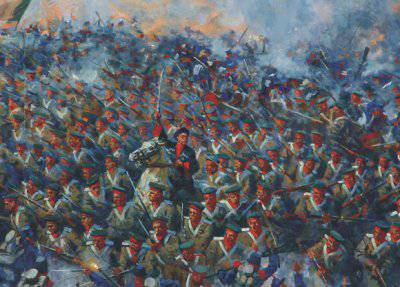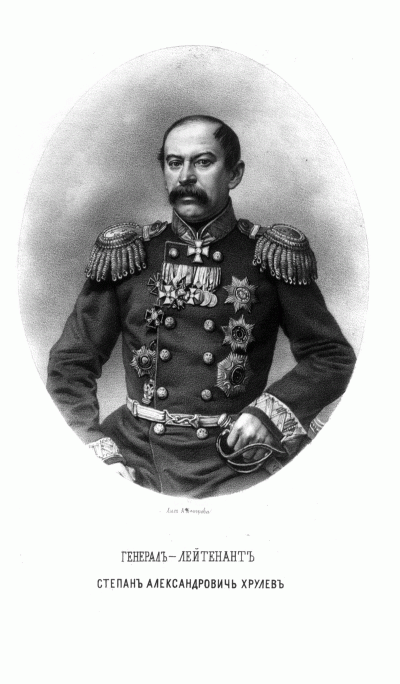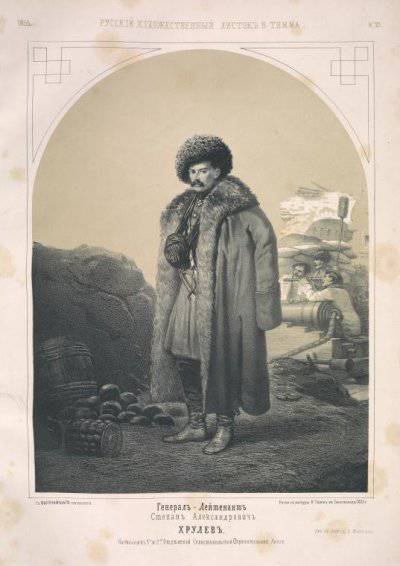Khrulev - commander within mediocrity
 Soviet historians assessed the leadership of the Russian army in the nineteenth century, for the most part, as worthless. The only exception, in their opinion, was Kutuzov, who defeated Napoleon’s armies, and also earned military leadership in other wars. but story it is such a thing, to look at which one should be critical, and thoughtlessly following someone else’s, even if respected opinion, is wrong.
Soviet historians assessed the leadership of the Russian army in the nineteenth century, for the most part, as worthless. The only exception, in their opinion, was Kutuzov, who defeated Napoleon’s armies, and also earned military leadership in other wars. but story it is such a thing, to look at which one should be critical, and thoughtlessly following someone else’s, even if respected opinion, is wrong.Among the little-known surnames of that time there is one worthy of special attention. In the history of Russia there were two generals with a similar last name and, interestingly, with identical initials. This article is dedicated to Stepan Alexandrovich Khrulev. The amazing fate of a talented military leader is closely intertwined with the failures and victories of the Russian army, so his official biography reflects the state of the military forces of the empire during this period.
The son of the leader of the nobility, Stepan Aleksandrovich Khrulev, was born in the Tula province in 1807 year. The Khrulevs' family was one of the oldest Russian noble families, leading from the middle of the XIV century and had common ancestors with the AV family. Suvorov-Rymniki. Since childhood, the boy showed an interest in the art of war and dreamed of a military career. Contributed to the enthusiasm of Stepan Alexandrovich communication with a friend of his father Bronevsky, who was the author of "Notes of a naval officer." His dreams of feats of arms resulted in a detailed study of the biographies of the great generals and their works, strategies and tactics. Stepan Aleksandrovich turned out to be a diligent student, easily mastered several languages and got excellent marks at the Tula Alexandrovsk School. He passed the final exams without difficulty in the Second Cadet Corps of the best military institution in St. Petersburg. Kutuzov himself finished this building once.
After successfully completing the training program, Khrulev went to the Noble regiment, later renamed the Konstantinovsky Military School. Here the young man trained, and also engaged in teaching, thanks to excellent knowledge in the field of mathematics. In 19 years, Stepan Khrulev was given the rank of ensign. Fate decreed that the beginning of military activity was laid in the 25-nd mounted light artillery company on the border with Poland.
The young commander of the baptism of fire took place in the beginning of the Polish uprising and already in the 1831 year, when he was about twenty-four years old, showed initiative and ingenuity. Extraordinary leadership skills were supported by accumulated theoretical knowledge and a little practice. In the Battle of Kozienice, Stepan Alexandrovich decided to put artillery in front of the infantry, which allowed him to destroy the enemy, without engaging in hand-to-hand combat. From a hundred and fifty steps from the Russians, shooting was opened with a canister that dispersed the ranks of the enemy. The Poles were so amazed at such an unusual tactical move that they could not take any reasonable steps, suffered heavy losses and lost the battle.
 However, despite the successful outcome, the initiative of the young Khrulev frightened his chief, Major-General Kreutz. The baron saw in Stepan Aleksandrovich a dangerous rival, therefore, not only did he not present him for a reward, but he also tried in every way to hide this episode. Khrulev was the first to use card grenades in combat, while everywhere they began to be used only twenty years later. The military company for Khrulev ended with the rank of second lieutenant, as well as the Order of St. Anna 4 degree with the inscription "For Bravery" and the Order of St. Vladimir 4 degree with a bow.
However, despite the successful outcome, the initiative of the young Khrulev frightened his chief, Major-General Kreutz. The baron saw in Stepan Aleksandrovich a dangerous rival, therefore, not only did he not present him for a reward, but he also tried in every way to hide this episode. Khrulev was the first to use card grenades in combat, while everywhere they began to be used only twenty years later. The military company for Khrulev ended with the rank of second lieutenant, as well as the Order of St. Anna 4 degree with the inscription "For Bravery" and the Order of St. Vladimir 4 degree with a bow. In the 1848 year after the battle of Weizen, being in the center of the superior forces of the Hungarian enemy, already being a colonel, Khrulev successfully pulls the time until the main forces approach. The bold, but effective decision to impersonate the plenipotentiary representative of the Russian troops, allows him not only to keep the powers entrusted, but also to achieve the surrender of the Hungarian army.
He sent parliamentarians to the enemy headquarters, and while they got there, and then formally negotiated with the Hungarian commander-in-chief, coordinating every point in the treaty, the pulled troops forced the Hungarians to capitulate. For this witty and courageous act Khrulev was awarded. From now on, the command not only became afraid of him, but even felt hostility towards Stepan Aleksandrovich. For the Hungarian company, Khrulev was awarded a golden saber with an engraving “For Bravery”, the rank of major general, as well as the Austrian Order of the Iron Crown of the second degree. In the Kokand campaign during the successful assault of Ak-Mosque in 1853, the talented commander was finally marked by General Perovsky.
The Crimean War Khrulev met on the Danube front. 4 March 1855, S.A. Khrulev was appointed commandant of the Ship's side with the subordination of the Selenga and Volyn redoubts, the Kamchatka lunette (the names are given by units that built and defended these fortifications), as well as all the forces located in the 3, 4 and 5 divisions of the defensive line . The general was extremely popular among the soldiers and officers, had the glory of a fearless commander. It was noted that he is appointed to the place where it is currently the most difficult and dangerous of all. Even then, Khrulev had the fame of a “soldier’s” general, and for the care of his subordinates he received the nickname Stareletor, who addressed all without distinction the same: “my benefactor”. He impressed the officers with the modesty and asceticism of his camping life. He was a commander who continued the tradition of the "Suvorov school". The battle of Kamchatka lunet brought Khrulev even greater fame: on the night from 10 to 11 in March, the general made a sortie from the Kamchatka lunet, Russian soldiers broke into the main French trench and laid down all the works produced there by the enemy. The fight lasted all night and only at dawn Hrulev gave the order to retreat. A brave general was noticed and rewarded by the emperor himself. 6 June 1855 of the year, during the general assault on Sevastopol, he fought off a battery of Gervais with a handful (on the right flank of Malakhov Kurgan).
After numerous storms, the French marshal Pelissier took Malakhov barrow. Count Totleben was wounded in the leg, but the defense still held for some time, then this part of the city was abandoned. Despite the controversy with the engineer Totleben, Khrulev enjoyed his respect and confidence. The engineer often consulted with him on the field fortification. In many respects thanks to the ideas of Stepan Aleksandrovich, fortifications are beginning to be used in the form of group trenches, hereinafter referred to as lodgments.
 The command did not pay attention or, rather, did not want to notice the merits of Stepan Aleksandrovich. Of particular interest is the memorandum to the Minister of War, which he submitted in 1856 year. The document was devoted to the justification of possible routes of the military campaign in India. The proposed solution demonstrates Khrulev’s foresight and political literacy. This quality allowed him to determine the weakest and most painful point of the main opponent of Russia - Great Britain. The situation in India was becoming increasingly tense, the natives were ready to raise a rebellion at any moment, so the invasion of Russian troops would surely provoke the overthrow of the power of the colonists. Such a maneuver could not only undermine the power of England and force it to abandon further military actions, but also weaken its influence in the international arena, as well as shake its financial stability.
The command did not pay attention or, rather, did not want to notice the merits of Stepan Aleksandrovich. Of particular interest is the memorandum to the Minister of War, which he submitted in 1856 year. The document was devoted to the justification of possible routes of the military campaign in India. The proposed solution demonstrates Khrulev’s foresight and political literacy. This quality allowed him to determine the weakest and most painful point of the main opponent of Russia - Great Britain. The situation in India was becoming increasingly tense, the natives were ready to raise a rebellion at any moment, so the invasion of Russian troops would surely provoke the overthrow of the power of the colonists. Such a maneuver could not only undermine the power of England and force it to abandon further military actions, but also weaken its influence in the international arena, as well as shake its financial stability.The experience of military battles suggested to Khrulev that in the offensive tactics one should look for new more advanced techniques. So Stepan Alexandrovich has an idea to create a new form of battle order in the form of a rifle chain. In addition, he considers it appropriate to change outdated muskets into a choke. As practice has shown, this decision was really successful and contributed to the victories in the clashes.
Fate decreed that the talented general did not command the armies, but he was personally known and highly valued by Emperor Nicholas I. General Perovsky spoke about him flatteringly in his letters. However, most of the command tried to keep Hrulev in the shadows. The reason for this was envy, fear of originality and courage of his ideas. Even the Hungarian commander-in-chief, surprised and admired by his exceptional tactical abilities, said of him: "Our brave knight, Colonel Khrulev." Ardent soldiers loved Stepan Alexandrovich ardently and devotedly, composed songs about him. However, the general had a chance to command only the corps, this man’s potential was not exhausted for a variety of reasons.
Stepan Alexandrovich died in 1870 on the night of May 22, he was buried in Sevastopol, which he bravely defended. On the tombstone is written: "Khrulevo - Russia." In this short phrase is the whole life of the general, dedicated to his homeland.
Information